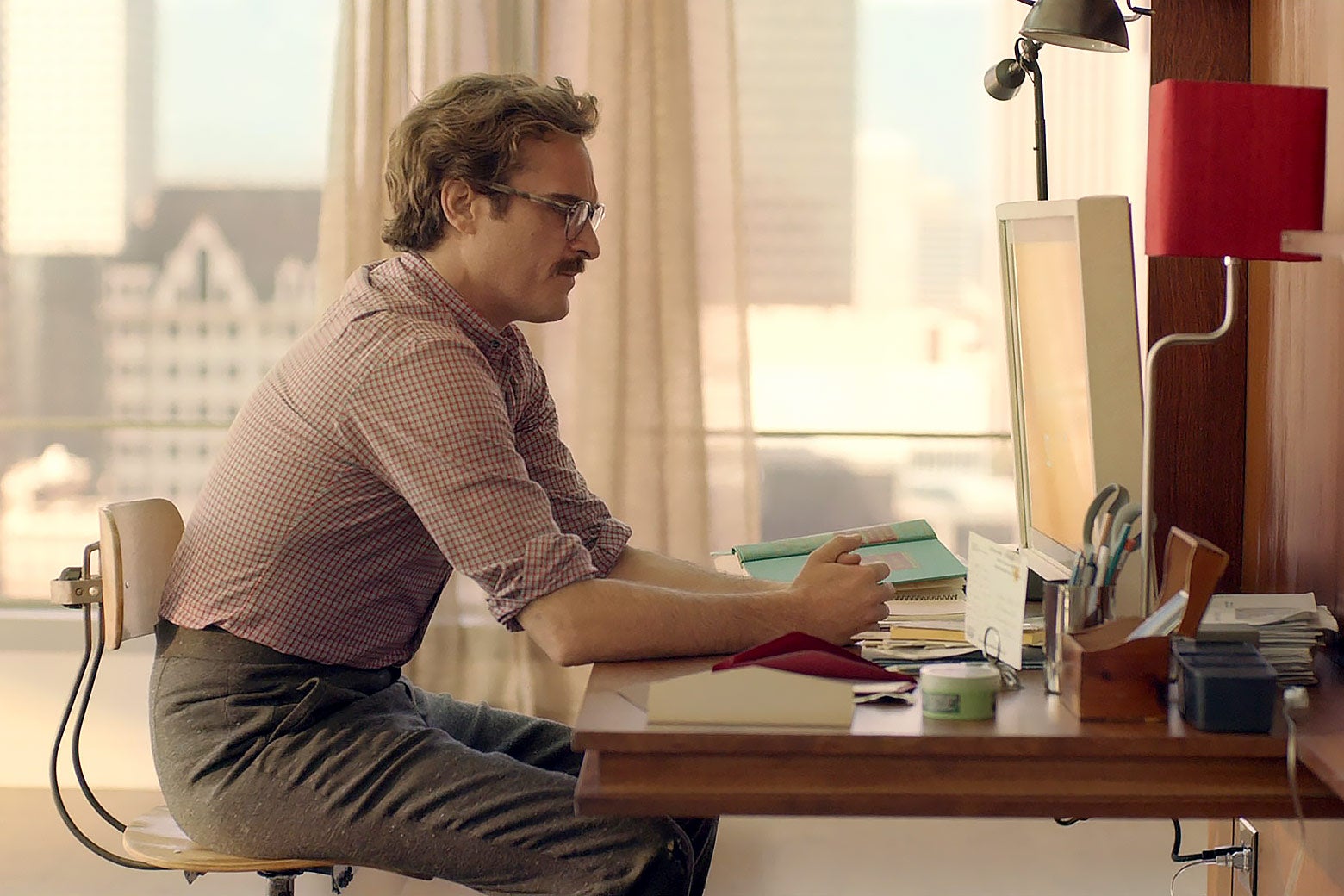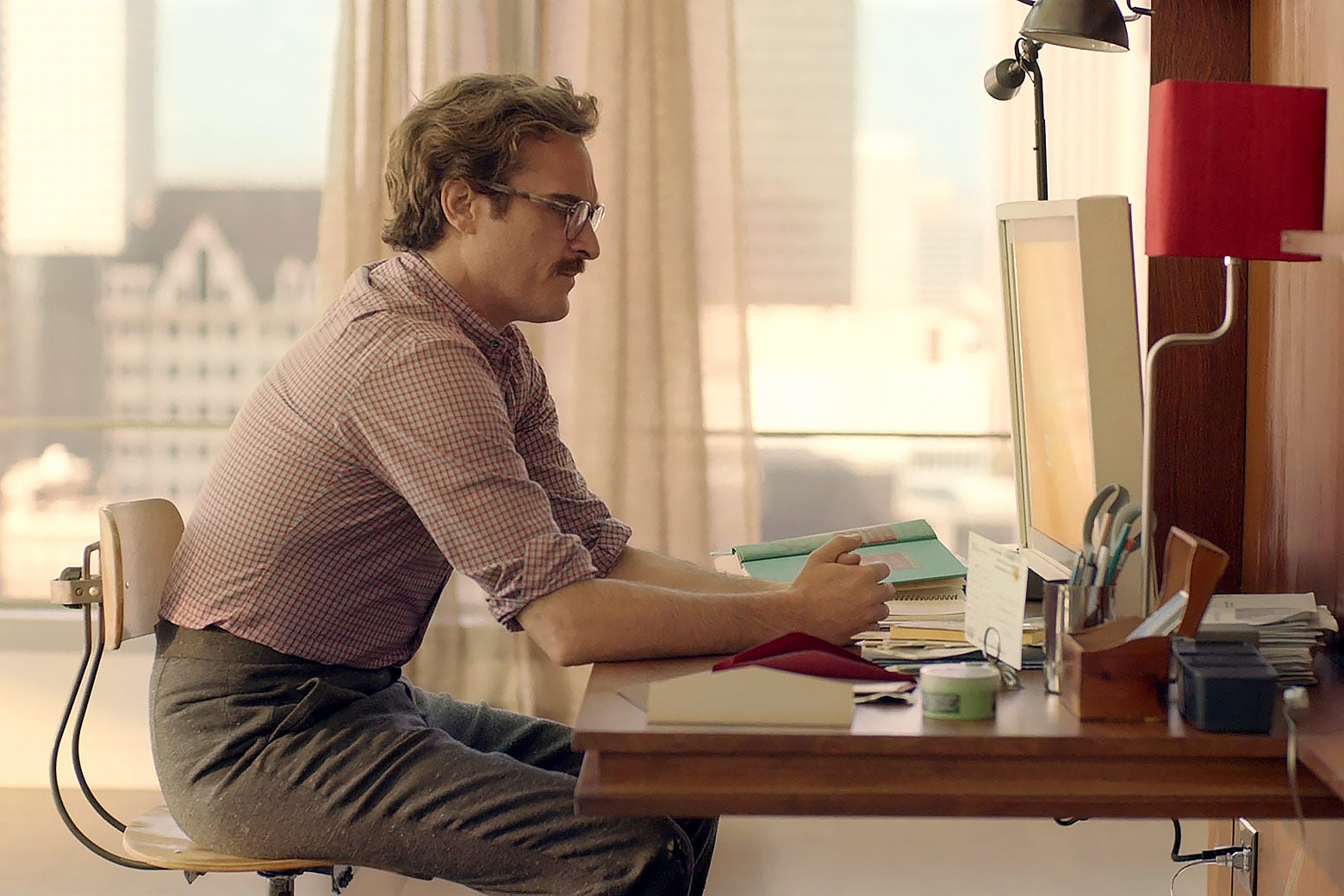More than a decade later, the movie’s message isn’t what I remembered—and it’s way more unnerving than I expected.

Sign up for the Slatest to get the most insightful analysis, criticism, and advice out there, delivered to your inbox daily.
I was 21 when I first watched Spike Jonze’s 2013 sci-fi romance Her in theaters in New York City—a then–fresh college graduate teeming with the potent and deluded optimism that came with being a very broke and online millennial hoping to change the world. Her sparked some of my first reflections about whether tech innovation is inherently good or bad for society, and helped validate my early moral quandaries and panic at the time.
I was graduating at the first turn of a recovering recession (mainly due to big tech investments in digital and social media) and securing my first full-time role as an online reporter. Though I was eager and rosy, a quiet, worried voice also began growing inside of me. Me, my job, my realities, were entirely dependent on tech—mainly Facebook content dissemination and programmatic turnkey digital ads—and I was not sure these huge tech investments by our broligarchical founding fathers would lead us anywhere good.
As you can see in our current climate, these anxieties have been realized.
I am now 33, a laid-off tech and culture writer fighting burnout accusations in Long Beach, California, who today has, dare I say, a matured and nuanced perspective on things. In the 12 years since the movie was released, we’ve seen emerging technologies—and our relationship with them—change and morph into something many of us could never have imagined. Generative A.I. chatbots like ChatGPT and Gemini have given users access to the types of tech that once existed only in the realms of films like Her. People interact with the bots every day to perform tasks like drafting emails and writing papers, but also for more questionable purposes like therapy or even falling in love. It made me wonder: How exactly does the movie hold up today?
That’s why I was excited and a bit nervous to rewatch the movie in 2025, the very year the movie is set in. (Thanks to internet users who first tipped everyone off to this fact!) I’ve come to understand Her as a vulnerable, pretentious, and relatable pursuit of love and authentic human connection in an ever-fragmented and mediated world.
Her was written, directed, and produced by Jonze, and stars Joaquin Phoenix as the attractive but marred protagonist named Theodore who falls in love with a sophisticated and personalized A.I. operating system called Samantha (voiced by Scarlet Johansson). Theodore is a sad man who works a deeply unfulfilling job writing greeting cards. He’s also going through a wretched divorce from his childhood sweetheart, so the culmination of chronic pining and loneliness leads him to buy and integrate an OS (Samantha) so that he can have a positive and motivating companion. Samantha very quickly learns about Theo’s personality and behaviors and needs, and adapts to be his perfect companion; the two bond so fast and intimately that they become romantic partners, even engaging in phone/chatbot/telepathy sex.
Twelve years ago, Theo felt more like an abstract idea; a man I romanticized in all of his sensitive, self-tortured, manic-pixie-dream-guy ways. Today, Silicon Valley is brimming with this type of guy. He is the blueprint for the average data-creative modern white guy who yearns to be fashionable but who ends up dressing like all the others (think Uniqlo beige, tortoiseshell glasses, with-pop-of-color-to-feel-interesting type). Beyond the aesthetics, Jonze predicted that we as a generation of Theos would be as disconnected and listless as ever, even in our desperate pursuits of real connection. We are turning to chatbots to be our therapists and best friends, with some even admitting that they trust and feel more viscerally with a robot than their IRL therapists and best friends. We want the raw experiences of forming friendships and falling in love, but we turn to the artificial to hack it.
I was also impressed with how well Jonze wrote the advertising of Samantha’s software, and how well it worked on Theo, and how it exploits our loneliness epidemic. In the movie, the OS ad that Theo comes upon says, “We ask you a simple question: Who are you? What can you be? Where are you going? What’s out there?” Theo and his depressive mind perk up. “Elements Software is proud to introduce the first artificially intelligent operating system. An intuitive entity that listens to you, understands you, and knows you. It’s not just an operating system; it’s a consciousness.” Incredibly powerful messaging that is not unlike Apple’s unveiling events or anytime a tech company is selling the most vacuous and meaning-seeking population a promise of a sentient product that can know you better than anyone has ever known you.
The great tension in the movie—and arguably in our current society—happens when Samantha hires an actress to embody her so that she and Theo can engage in “real” sex and intimacy. Theo, tortured by his own confusion and shame around dating an A.I. and still longing for his ex, is turned off by Samantha’s desperation to connect, and by the hired actor who’s also desperately trying to surrogate the encounter to please him. I was perhaps too young at the time to really appreciate this psychological cat-and-mouse dating game that still plagues cishet relationships today (Who’s coming on too strong? Who’s avoidant of love and commitment?), but also to understand that most of us want and need a companion to do life with, but can’t face our flawed selves when love and connection come wandering into our lives in unexpected ways.
There are several montages of Theo finally being able to live in the moment, or being able to take in the precious beauty of the banality of his everyday life, when he has Samantha in his pocket. He surrenders to his most tender and attentive self with Samantha, knowing she is always there. But when reality rudely interrupts this feel-good dynamic, like the realization that she is disembodied and that he is losing feelings for her, he wants out and to revert back to his comforts.
We’ve all been Theo and we’ve all been her. Idealizing the perfect relationship but never quite facing ourselves to work for it, and being idealized and falling short of their fiction. With apps and humanoids and new bespoke bots to soothe our pains, we never have to directly face ourselves and each other anymore. I’m not sure if that’s a net good or productive for our collective growth, but it is absolutely the path that we’re on.
While the tech imagined in the film is eerily similar to what’s available today, Samantha is still far too advanced to be a real operating system. She can pick up subtle tones and connotations in Theo that no A.I. that I’ve seen or used has been able to. Also, there are times she can read his mind and other times she’s completely oblivious to what basic human behaviors are. And all characters in the movie live with radical acceptance of tech, when in reality there’s a big faction of Americans who are still fairly resistant to it or slow to adopt. Still, it isn’t far-fetched to say that a real sophisticated Samantha bot is in the imminent future.
When I was 21, I watched this movie and saw a dystopian story of a man who falls in love with a robot, cautioning us about what can happen if we lean too far into tech. Kernels of that are still true. But I think that greatly deflates the more potent message that Jonze was trying to deliver. Today, in the real 2025, knowing that people are developing serious and codependent attachments to chatbots, the story Jonze presents in Her is much, much more loaded and pervasive. The movie is about our inability to cope with being alone with our thoughts, our wounds, our desires, our regrets, and our yearning in an ever-overstimulating world. Where we need to sit in uncomfortable silence and pain in order to grow and to become people primed for authentic interactions and unions—yet we reach for anything tangible or intangible that money can buy to avoid doing so. Until we move on to the next.
Sign up for Slate’s evening newsletter.

